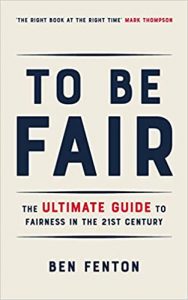Where do the days go? I’ve split my reading time between several books this past week or so, and finished only one: To Be Fair: The Ultimate Guide to Fairness in the 21st Century, by Ben Fenton. This is a wonderfully readable book (written by an ex-journalist) that both summarizes a wide range of scholarly literature on fairness – from psychology and evolutionary science to history – and at the same time advocates strongly for the need to put fairness at the centre of public life and policy.
The first part of the book is a summary of what different disciplinary approaches can tell us about fairness. I had read some of this (eg Frans De Waal’s primate studies) but not all. The main message is how profoundly important fairness is to humans. The second part looks at fairness (and its absence) in different contexts, such as sport, politics, business, tax, law and tech. I found these more interesting, and took away lots of nuggets of insight.
I liked the chapters on business and on media/communications best. There is a lot of injustice to skewer in either case. For example, the book points out: “Business and finance words that aren’t about stability are likely to be about sharing: equity, shares, dividend.” Of course there are lots of other business and finance words, but I liked the point. Or about private equity types: “To them fairness is a word for suckers. I am not sure why we keep letting them get away with it.”
Nor am I. The inequality scarring many societies today is fundamentally unfair – there is an absence of justice – and it has been getting worse. This past year I’ve been veering between optimism that this crisis will prove a turning point leading to major reform of an unfair economic system, and pessimism that such trends are only reversed after a period of significant conflict. After all, nothing changed after the 2008 financial crisis. I still can’t decide – who knows? But To Be Fair has found its moment.

